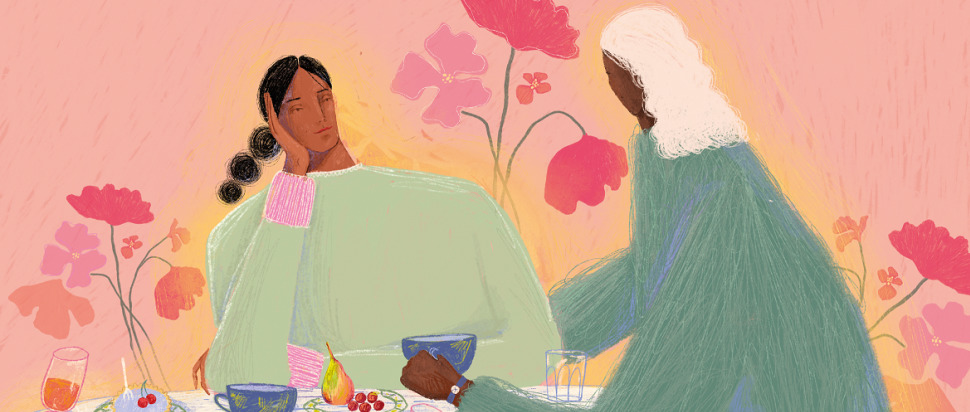Fika as Fuel: The need to rest and connect
There's power in taking time for ourselves and for each other. After spending time in Sweden, one writer reflects on how the country's culture harnesses this power – and how we should too
For those unfamiliar with the Swedish art of fika, it can be described as coffee and usually a pastry (fikabröd) with a friend or two. But fika is far more than coffee and cake like we have in the UK; ‘to fika’ is to take part in an intrinsic Swedish culture; it is a space for meaningful connection, slowed conversation, reflection, and care. In the last two years we’ve heard increasing calls to slow down, to connect, to reflect. It’s a political issue, as well as a personal one, with stress, anxiety and depression as a result from work only increasing.
To understand fika better, and what makes it a somewhat radical phenomenon, it’s useful to explore its history. Coffee arrived in Sweden in the late 17th century, and by the mid-18th century coffee houses were increasingly run by women. Stockholm even protected women-run coffee houses, with one quarter of all licences being earmarked for women living in poverty. When Sweden began to ban coffee due to royal decree, many women took to illegal trade routes to maintain their businesses. Beans were sold from homes or hidden in bags of shopping. Women were vital to keeping Sweden’s coffee coming, even when it was illegal. Many of those arrested for selling coffee were poor women; those arrested for drinking coffee were also mainly women, many of whom worked in factories. The sharing of coffee amongst women friends during coffee prohibition would have strengthened bonds and helped develop community feeling. The depth of connections formed during these early secret fikas contributed to continued coffee bans. Having a well-connected, considered and reflective society does not make for overly loyal workers.
The Swedish Labour Movement was formed shortly after the final Swedish coffee bans in the early 19th century and demanded eight hours of work, eight hours of freedom and eight hours of rest. At the same time in the UK, children younger than 13 years were limited to working 48 hours a week, and everyone else limited to 69 hours a week. Decades before other European countries, Sweden had demanded better working hours. This feeds into the importance of fika more widely. It recognises a need for connection, care and reflection that has been largely neglected in UK workplaces until recently.
Nowadays, fika at work is just one way Sweden creates and supports connectivity amongst its workers. Many workplaces, including my own, work 9am-4pm. Across Sweden, working hours must not exceed 40 hours a week; in the UK it’s 48 hours. Sweden ensures workers receive at least 36 hours of rest whilst the UK offers 24 hours. Flexible working is embroiled within Swedish law, meaning employees must be able to work flexible hours or from home if needed. Fika reflects these working principles. Folded into the working day, fika is not considered a break from the work but an integral part of it. It dismantles organisational and social hierarchies, something we definitely need more of in the UK as we face increasing socio-economic erosion from those in power.
I naively thought fika was just coffee and cake, until I started having fika with friends, colleagues and peers. The time is protected, and in many Swedish organisations fika is compulsory. There are no bonus points if you work through your organisation’s fika. In fact, it’s considered rude. For me, fika at work has been a revelation. Fika offers us all time to connect and reflect on what’s happening. For deepened and careful conversations. The work still happens – I think it just happens at a more considered pace. I achieve as much but with less frustration, stress or fear. There are fewer mistakes; my brain has space to breathe. I’m not exhausted or overwhelmed even though I'm facing the same tasks. Those pangs of imposter syndrome that used to linger have disappeared, simply through being surrounded by people I feel a deep sense of community and connection with.
Fika with friends is a little different. Not only are we not at work, but we rarely talk about it. Our conversations are gentle and winding and rarely feature the intense emotional off-loading of coffee meetups I have in the UK. The protected nature of the time, the connectivity and deepened conversation, and the space to be open, honest and a critical friend is something very different to having coffee and cake in the UK. It took me by surprise, the immediacy of connections with new people in a new place when given the time and space. Nurturing our friendships can be a radical act – and it’s one that I’m grateful to fika for facilitating.
Just as the Swedish women who illegally sold coffee and gathered around it to talk, share and build community, contemporary fika offers us similar possibilities. Fika offers us all a slower approach to work and life. It’s a chance to build community together at a time when communities are being decimated and millions are facing crisis. At this time in the UK, we need to grab the opportunity to reflect and share with both hands, to shake off the burden of working until burnt out and re-energise so that we can fight for a better future. Fika gives us these opportunities. Fika could help fuel that fight.
